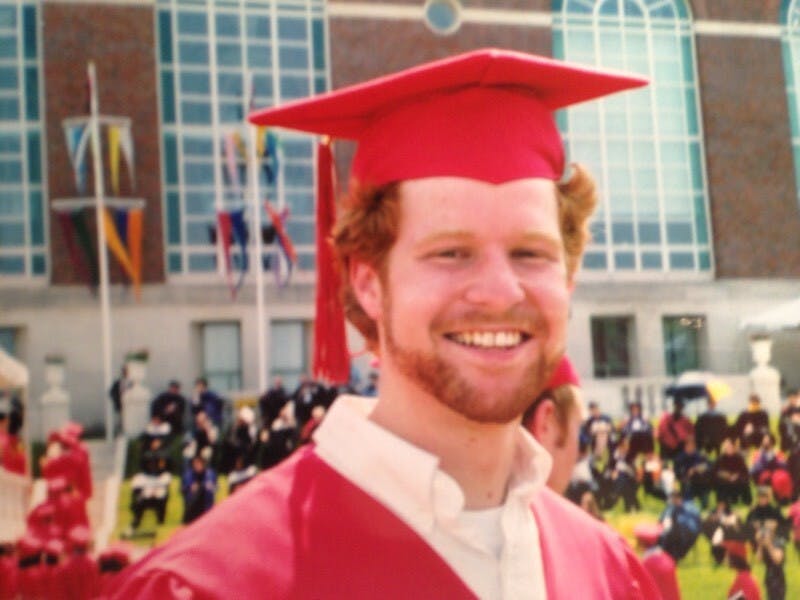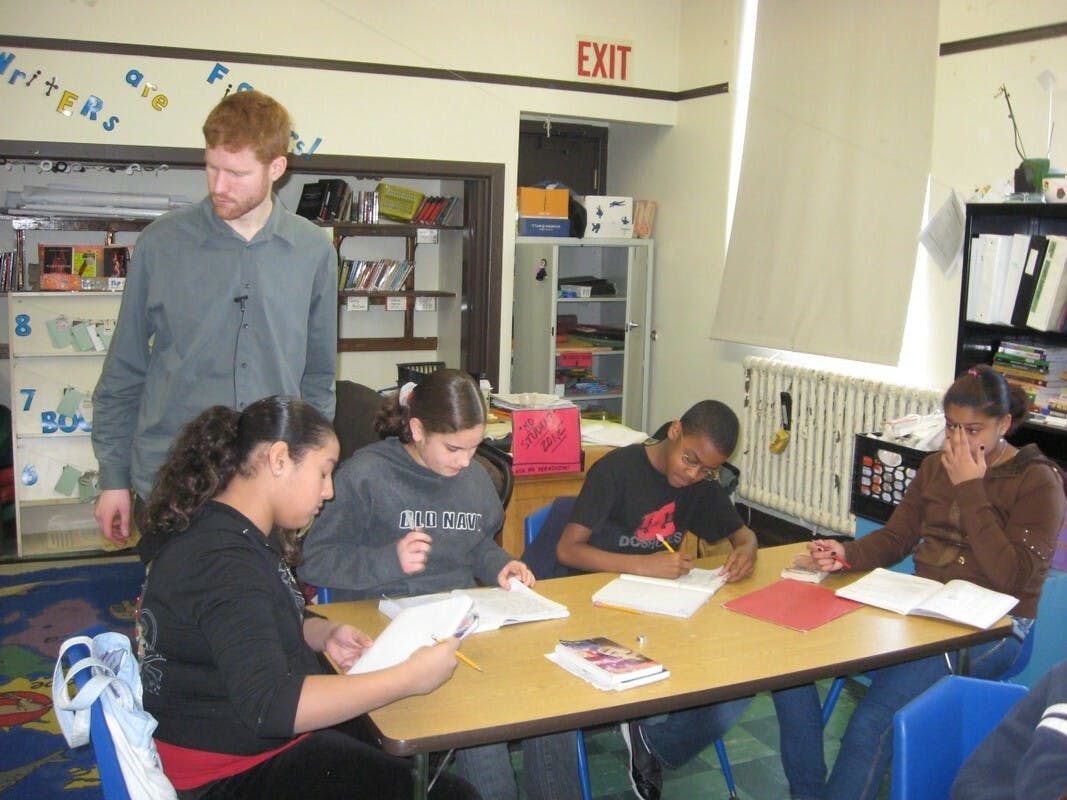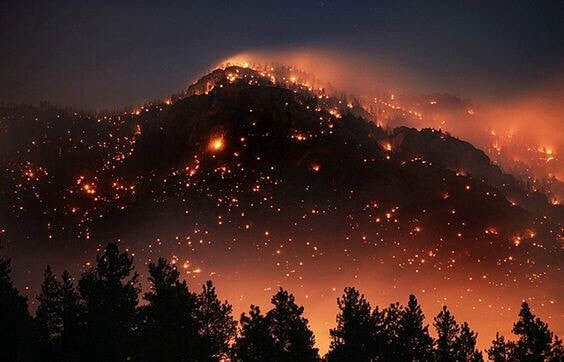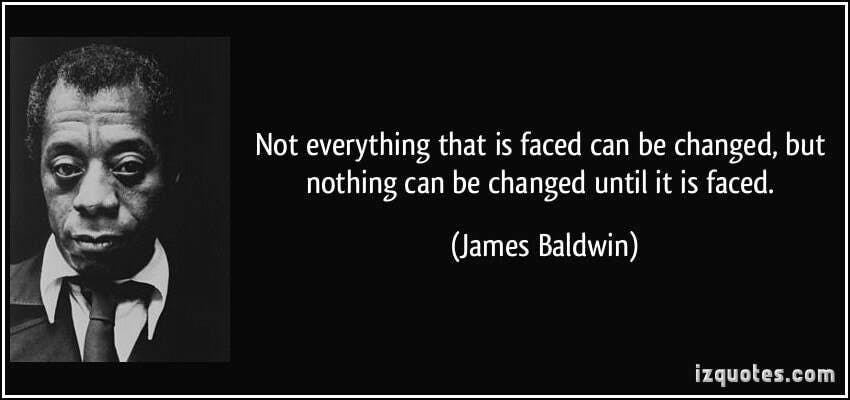The Gift of White Burnout
I once thought we could get to justice if we could just help poor kids of color get more comfortable with their poverty.
By Abraham Lateiner

Burnout saved my life.
I didn’t think so at the time. In fact, while it was happening, my burnout as a public middle school English teacher felt like watching a close friend dying a little bit each day while I helplessly looked on.
For ten years, I was a dedicated teacher, spending my time, energy, and money in order to provide the best education I could for my students.
But something was wrong. It wasn’t that I wasn’t working hard enough. It was that I was working in the wrong direction.
What work is mine to do?
Today and every day, I give thanks for my blessed burnout. It was that burnout that forced me to leave my post as a wealthy White teacher of mostly low-income children of color. It was only then that I began to be able to see a way to live with integrity — by finding and committing to work that was uniquely mine to do.
Today, my work is organizing rich people and White people towards racial justice via collective and sustained redistribution of wealth. I am held accountable by my personal relationships, my professional connections, my relationships with mentors, and my communities that love me enough to tell me the truth. I have never felt more alive or more in community than I do today. All this, thanks to my White burnout.
My teaching story

I graduated from Wesleyan with my B.A. and after a few years of working at educational nonprofits, I earned my M.Ed. through UMass. During my student teaching, I was supported by great mentors, and I came to know what great teaching looked and felt like.
Hired for my first classroom teaching gig in a local K-8 public school, I was eager.I taught students to read and process Shakespeare via read-alouds, group discussion, and acting out scenes. We held weekly circle meetings which allowed students to bring up grievances and concerns with others and deal with them productively.
As I experimented and steadily built a classroom culture of appreciation, reflection, and rigor, I saw the vast majority of students’ standardized test scores steadily increase. I was affirmed by my administration, the families of students, my peers, and students themselves.
Burnout
After three years, due to a conflict of expectations with my administration, I decided that it was time for me to move on to a new school. The transition didn’t go well. I jumped into a botched experiment in team-teaching and also was required to teach content I didn’t really know. Due to all of this turbulence, I never got my footing at the new school. Students could tell that I didn’t feel secure in myself and weren’t sure what to make of me. I began to take on the identity of a lost teacher.
After spending seven years as a consistently successful educator, my daily mediocrity became intolerable, and yet I didn’t know what to do about it. I tried getting coaching. I called on my mentors. I got various kinds of professional development. Nothing changed. Soon, I felt a smoldering heat that eventually became burnout.
Burnout was knowing that I was an excellent teacher, while watching myself consistently making bad teaching choices.
Burnout was seeing the look in my students’ eyes when they began to see that I no longer believed in myself. I resented them for perceiving this, and then resented myself for not knowing what to do about it.
Burnout was beginning to understand where the grizzled, cynical teachers come from, the ones who are demonized by for-profit educational firms. Those teachers didn’t start out that way. No, they had developed these coping mechanisms to deal with and survive in a system that made a mockery of their dreams as educators.
Burnout was parking my car by the side exit of the school on a snowy December day, and slowly moving boxes down the stairs to load in the trunk, as snowflakes fell around me in silence. I backed my car out from the parking lot, one last time, leaving tire tracks surely covered by falling snow a few minutes after I left.
The gift of the reset button
I am thankful for both the insight to see what was happening to me and the financial stability to leave teaching when it became clear that staying would be damaging for students’ educations and my own soul.
Unlike many teachers in my position, I could afford to take some time off to figure out what had happened to me and my dreams. It was clear to me that there was something about my understanding of the world that was out of touch with reality.
With the support of many people around me, I came to the realization that I would have to put in work in order to fully process my burnout or I would continue to burn — even in a new job.
Today, I can look back and see this experience as a gift. I was being forced to hit the reset button. For a straight White man with access to money, forced opportunities to start over like this can be extremely rare since so much of the world colludes to keep me firmly believing in the delusion that I am superior to the rest of humanity. My burnout gave me the space to confront my grief, which formed the foundation upon which I could finally begin doing my own necessary work.
Through conversations and readings, I began to see that I was avoiding doing that work while believing that I was doing the world a great service. While there were indeed many valuable things that I could teach my students, and good work that I could do in that role, it was not especially my work to do.

What especially qualified me, as a rich White guy from the suburban Midwest, to teach children of color from some of the poorest neighborhoods in Boston, a place I didn’t grow up or have lived experiences in?
Yes, the children I taught needed support and education and healing, but the context we sat in — vast cultural divides between me and my students, my own lack of introspection and understanding of power, and a system that has never truly served poor children of color — set me up to fail. As I dedicated myself to a nearly-impossible task, I ensured that I would be left with no time or space to begin asking a terrifying and necessary question I alone could ask:
What makes me believe that this is my work to do?
This question grew out of a seed planted in me by an organization called Resource Generation. Resource Generation is a community of young, progressive people with wealth and non-wealthy allies, organizing together towards the redistribution of land, wealth, and power. Through my work with Resource Generation, I began to see that maybe the way I could be most effective would be to organize my wealthy peers to see the ways that wealth is destroying people’s existences, our relationships, our society, and the world around us.
If I hadn’t burned out, if I had learned to accept the new identity of “mediocre teacher,” I could have continued going through the motions of teaching, believing that the best work I could do was preparing poor children to struggle to become exceptional enough to survive the machine.
But I accepted the gift, left, and sank into the flames.
Chains of guilt

The next question was this: if my best work will be with my peers — those who “speak my language” — what would that work look like?
To begin to answer this question, I had to throw out my old ways of being and thinking. My role in the world — guilty privileged person seeking absolution by helping oppressed people to survive — had been torn apart. I had to take on a “beginner’s mind” in which I acknowledged that I didn’t even know the vast extent of what I didn’t know about teaching and the world around me.
With this, I discovered a humility in my interactions with others that wasn’t available before. I was learning to feel, for the first time, grief from the loss of my dreams, and it left me more ready to listen.
As I learned more about the systemic nature of oppression, especially in the context of the Movement for Black lives, I was paradoxically learning to love myself more as a White person as I began to see the depth of my own complicity in oppressive systems.
I began to see that my “failure” as a teacher was not simply “my” fault, but instead an understandable result given the systemic sickness of our society. That sickness makes comfortable liberal White people like me work our butts off to “save” at-risk children, but puts blinders on us as to why we continue to uphold a system that puts children at risk in the first place.
I began to repeat my question over and over: What is the work that is mine to do?
Black grit and the world turned upside down

My hard work as a teacher had paid off for some individual students, and that had propped up my dream that all it takes for low-income children of color to overcome oppression is “personal responsibility” and “grit.”
As I saw the narratives of the Movement for Black Lives unfolding around me, I began to see that grit couldn’t save Trayvon Martin. Or Shade Schuler. Or Sandra Bland. Or Eric Garner.
Much to the contrary, I began to see that their Black grit had motivated their murderers.
Wasn’t it grit that drove Eric Garner to eke out a living selling single cigarettes on a street corner? Wasn’t it grit that supported Shade to live out the truth about her identity deep inside her, despite society’s inability to accept it? Trayvon Martin and Sandra Bland’s grit infuriated their assailants, and we know how those stories ended.
I see their killers walking amongst us today, and I see "grit" being packaged and offered as the way out of poverty for poor children of color. Something about this was not only wrong, but actually inverted.
When James Baldwin told me that White people were describing ourselves when we called Black people “n*gger,” he pulled the last floorboard out from underneath my feet. “You’re the n*gger, baby,” he lovingly told me, and I finally began to understand that the problem of oppression begins in the minds and hearts of the oppressors, not the oppressed. The world had been presented to me upside down.

As I began to listen more intentionally to the voices of people of color, and women, and queer people, and low-income people in my life and in the media, I began to see that my position in society as a wealthy White man made it impossible for me to actually live in integrity with my values — no matter what good work I was doing.
I have always been moved by a belief in democracy, equity, dignity, and fundamental human rights. But the material privileges I enjoy every day are possible thanks to a foundation of land theft, enslavement, genocide, mass rape, and extortion. Getting cleansed of the original sins of my forefathers is impossible until we repair the damage already done. This filth, too, is my inheritance.
When I began to understand that, I was able to dive into work that is mine to do — organizing other people of privilege and comfort to work joyfully to try to dismantle the systems that would keep us sedated and silent in the face of a culture of death and destruction.
Day 1
I am in recovery from my upside-down worldview, but I’m still at-risk. I have not left behind those delusional mindsets of privilege that led me to burnout as a teacher. I am still a wealthy, straight White man in a world that is constantly reassuring me that everything is great, and I am all right, and there is no reason to rock the boat.
I’m going to have to constantly fight not to be lulled into complacency by the constant stream of reassurances that the world offers me. But at least now I know what I’m up against. This awareness has brought with it a profound, paradoxical joy…the joy of knowing that I have confronted my own shadow and that through surrender I can be stronger than that shadow. And all of this would be impossible were it not for my White liberal burnout.
Thanks to Martha Collins, DiDi Delgado, Andrew Grant-Thomas, and Ben Morse for editing help.
Abraham Lateiner



